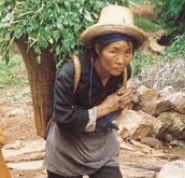Yizi in China

Photo Source:
Copyrighted © 2026
Operation China, Asia Harvest All rights reserved. Used with permission |
Send Joshua Project a map of this people group.
|
| People Name: | Yizi |
| Country: | China |
| 10/40 Window: | Yes |
| Population: | 2,900 |
| World Population: | 2,900 |
| Primary Language: | Chinese, Mandarin |
| Primary Religion: | Ethnic Religions |
| Christian Adherents: | 0.00 % |
| Evangelicals: | 0.00 % |
| Scripture: | Complete Bible |
| Ministry Resources: | Yes |
| Jesus Film: | Yes |
| Audio Recordings: | Yes |
| People Cluster: | Chinese |
| Affinity Bloc: | East Asian Peoples |
| Progress Level: |
|
Introduction / History
Despite their similar names, the Yizi are not related to any of the Yi groups in China who are speakers of Tibeto-Burman languages. People know the Yizi as Yiren or "Yi people," which further confuses the matter. In the 1950s, the Yizi applied for recognition as one of China's official minority groups. China rejected them. At the time of the 1982 national census, China still had not classified them and included them in a list of undetermined minorities. After some debate, China placed the Yizi under the Gelao nationality in 1985. The Yizi, who have a separate ethnicity from the Gelao, are not entirely happy with this decision. They view themselves as different from all other groups in China.
Today's population of the Yizi is far lower than it was during the Ming Dynasty (1368-1644). During the Qing Dynasty (1644-1911), China considered the Yizi as included in the Yi group, even though they have never claimed to be Yi themselves. Today, most Yizi have assimilated into the various Han and Yi cultures.
What Are Their Lives Like?
Most Yizi now work as sedentary agriculturists, but before the advent of communism in 1949, people renowned and feared them throughout the region as a fierce people. Still today, neighboring peoples despise the Yizi and claim they are all thieves.
What Are Their Beliefs?
Some of the more remote communities of Yizi practice animism, although in most places now only the elderly continue to observe animistic rituals and appease spirits. A common thread that ties the Yizi together is ancestor worship. The Yizi in different locations have the same ancestors. At least three times each year, the Yizi hold a ceremony to honor the spirits of those who have gone before.
Because of a lack of specific information about the Yizi, no one knows if there are any Christians among them. It is possible they do include believers, however, because of the high density of Christians in the Bijie area of Guizhou Province, especially among the Ahmao, Gha-Mu, and the various branches of the Yi nationality.
What Are Their Needs?
Like people everywhere, the Yizi people need to allow the loving Savior to direct their lives. They need his forgiveness for sin.
Prayer Points
Pray for the Lord to intervene in Yizi families, calling many to his side.
Pray for loving, Holy Spirit lead workers to go to the Yizi.
Pray for the Lord to raise up Yizi persons of peace to welcome Christ's ambassadors.
Pray for a church planting movement to thrive in their communities.